Have you ever noticed that it seems like every single company seems to send their email newsletter at the same time?
Usually they’re sent very late at night or extra early in the morning.
Which is, funny enough, when most of their audience is sleeping, so we wake up with an overstuffed inbox each morning.
I am guessing that you have also run into this somewhat minor annoyance.
But it literally is one of my biggest pet peeves.
If you are like me, the deleting of most of these newsletters has become part of your morning ritual.
It is pretty refreshing to send them all to your trash folder and get back to inbox zero.
I mean I love reading about data driven marketing tips but not at 7 in the morning.
We are constantly plugged into our email accounts with those supercomputers we call phones.
The days when you would check your email once in the morning and once at night is over.
But, alas, some companies still seem to be sticking to that email schedule.
This strategy is as outdated as that jewel colored iMac or Gateway computer sitting in your basement.
And all the effort you put into great content will be wasted if you pick the wrong time to send.
So I set out to find when the best time to send an email newsletter is, in the most scientific way ever, by signing up for 100 different newsletters and recording all of their send times.
1. Send it from 11-12PM, 1-2PM, or 2-3PM
If you were looking for the best time to send an email I would recommend selecting a time where there is little competition.
Like a time when almost no emails are being sent.
I mean why would you want your newsletter competing for your audience’s attention with a bunch of other emails?
That is just a recipe for low open rates and a drop in subscribers.
So to avoid that I would shoot for a period when no other emails are sent.
In fact, from 11-12PM, 1-2PM and 2-3PM not a single email was sent in our study.
Like not a single one:
Now you may be asking what is the best chunk of time out of those three periods?
And I would have to say that 2-3PM has the most potential.
From 11-12PM and 1-2PM are too close to the lunch hour and could get lost in the shuffle.
Unless your newsletter deals with a fun topic that they would want to read about on that break, I would avoid those two.
Instead try from 2-3PM.
Your audience will most likely be back from lunch by then and feeling a bit recharged.
They have already cleared their emails from the morning and are maybe looking for a little procrastination opportunity.
And boom, your email newsletter is there to help them out.
2. Or from 10-11AM
Now if you don’t want to be the only one sending an email during a certain time period, I have a perfect time for you.
This is another period where almost zero email newsletters were sent out in our study. In fact there were only one email sent out in that whole time period.
And I think that your email can handle a little competition.
This period happens to be from 10-11AM.
As you can see in the graph above there were a few other periods when only a few emails were sent.
But I do not think that they will be as fruitful as from 10-11AM.
For example, from 9-10AM is when a lot of people’s workday starts and 4-5PM is when it usually ends.
That means you are going to be fighting a lot more for their attention than just a few emails.
So to avoid these outside distractions I would choose from 10-11AM.
By then your readers will be settled into their desk, the coffee has kicked in and they are probably at inbox zero.
It is almost a perfect time for an interesting newsletter to pop up in their mailbox.
Additionally, I do find it a little odd that from 10-11AM has been pushed by experts and thought leaders.
But exactly one email was sent.
It really does not make sense, but it does present a new opportunity for your email newsletter to shine.
3. Never between 6-7PM
After carefully counting on both of my hands I was able to determine the worst time to send an email.
This time period was so crowded that more than 10% of all the emails in the study were sent during this hour chunk each day.
That is almost triple what an average hour should have received.
If you have read the graphs above you saw that 6-7 PM got the most emails of any period.
As you can see in the graph above if you decide to send your newsletter in this time period you are going to have some competition.
So I would avoid sending your newsletters during this period based on the jump in competition.
When you compare it to the times we already highlighted above there are 50x more emails during this period.
Even some of the times that got 5x more emails are looking pretty good to me right now.
Unless you want your open rates to plummet from that increased competition I would avoid sending from 6-7PM.
It does kind of make sense why brands would decide to send their weekly email at this time.
Their audience has made it home from their jobs and starting to relax. They should be pretty open to receiving a newsletter about their hobby, interest or activity.
But again, you are brawling in their inbox with a ton of other well-crafted emails for their attention.
Or it will be ignored and rolled into the next morning’s inbox clearing.
4. And avoid after 9PM or before 7AM
One of the easiest ways to fall into that morning deleting spree is to send your email late at night.
Like when your audience is sleeping, so they will see it in the morning.
I never really got the idea behind this practice.
Other than that brands think we want to read about the newest social media marketing tip at 6am.
I know that is the last thing on my mind at that time.
Now if it was an email about coffee being delivered to my bed that would be a different story.
But alas, I saw a ton of companies using this somewhat outdated topic.
We can access our emails at literally any time, the novelty of waking up to news or a newsletter no longer exists.
Or it is so far down the list in their inbox, they will never even see it.
Between 9PM and 7PM more than 60% of all emails in the study were sent.
With nearly 40% of them were sent between 9PM and 2AM. Or about double of what should have been sent if all things were equal.
That is a lot of emails your newsletter is going to be fighting.
Plus your audience is most likely not even awake, and the people who are up at that time probably don’t want to read your newsletter at that moment.
That means, you guessed it, that it will be put off until the next morning.
From there it goes right into the morning delete spree or simply forgotten about.
And all your hard work on the newsletter goes ignored.
Do not let your content be wasted because you chose the wrong time to send a great email.
5. Wednesdays & Saturdays Have Potential
Just like in the previous sections you are going to want to pick a day that has the least competition.
By sending your email on a day like this it is going to stand out like a beacon of good content.
The best day to send your email is Wednesday, with Saturday coming in at a close second.
As you can see they were some of the days to receive the least emails overall.
In our own tests we have seen Wednesday perform well, with some newsletters getting double the open rate of previous days.
I think that Wednesday is the perfect day to send your email newsletter.
Especially if your newsletter is related to their job or work.
They will feel a lot less guilty about losing themselves in your content for a few minutes.
Plus if it is really amazing they will want to share it with their coworkers!
And that means that if your topic deals with a fun hobby or interest I would send it on a Saturday.
Your audience will a lot more receptive to reading about something they could do later that day.
Or they will have a lot more time to absorb all of your fantastic content.
Either way both of these days are a great point to start testing to find what your own best day!
Before we go on I think it is important to highlight why I did not select Sunday as the best day.
I really think that it is too much of a wildcard day and the email could be lost in the shuffle of that day.
Then it gets pushed into the Monday morning mass inbox cleaning.
And although you may have loved to read the content you just don’t have time to.
This has happened to me too many times to count and I am guessing many people can relate.
6. Thursdays are the Worst Day to Send
Finding the best day to send an email was a little difficult and not very straightforward.
Thankfully the worst day was a lot easier to find.
And that day was Thursday.
It received more than double the amount of emails when compared to Wednesday and Saturday.
Exactly 25% of all the emails were sent on a Thursday, with no other days really coming close.
That put it well above the 70 or so emails I received per day on average.
Some experts proclaiming that Tuesday and Thursday are the best days to send a newsletter probably cause this.
I am guessing that people have been blindly following this advice for the past few years.
And now we are in a situation where the best day to send an email has actually become the worst day.
Conclusion
So there you have it, the best and worst times for you to send an email newsletter!
I now need to go click unsubscribe on about 100 different emails.
Or I may just cut my losses with that email address from now on.
But that sacrifice of an email address was definitely worth it because I was able to get some interesting findings.
Those findings will hopefully keep you from sending an email newsletter at the wrong time or day.
Just remember:
- Send newsletters during these time blocks: 11-12 PM, 1-2 PM & 2-3 PM.
- Between 9 and 11 AM is another great block of time.
- If your newsletter is related to their job, send it during the workday.
- Do not send newsletters at peak work movement hours, like 8 AM and 5 PM.
- Emails sent during the night or early mornings are a bad idea.
- Thursday is the worst day to send an email.
- Mondays and Fridays should be avoided as well.
- But the best day to send a newsletter is on Wednesday.
And finally, it is important to remember to test all of these findings with your audience first. These tips should always be used a testing points for your new emails, not set in stone facts.
About Kissmetrics
Kissmetrics combines behavioral analytics with email automation. Our software tracks actions of your users across multiple devices allowing you to analyze, segment and engage your customers with automatic, behavior-based emails in one place. We call it Customer Engagement Automation. Get, keep and grow more customers with Kissmetrics.
About the Author: Ryan McCready went to the University of Arkansas and graduated with a degree in economics and international business. Now instead of studying the economy he writes about everything and enjoys stirring the pot.
from The Kissmetrics Marketing Blog https://blog.kissmetrics.com/sending-newsletter-at-the-right-time/
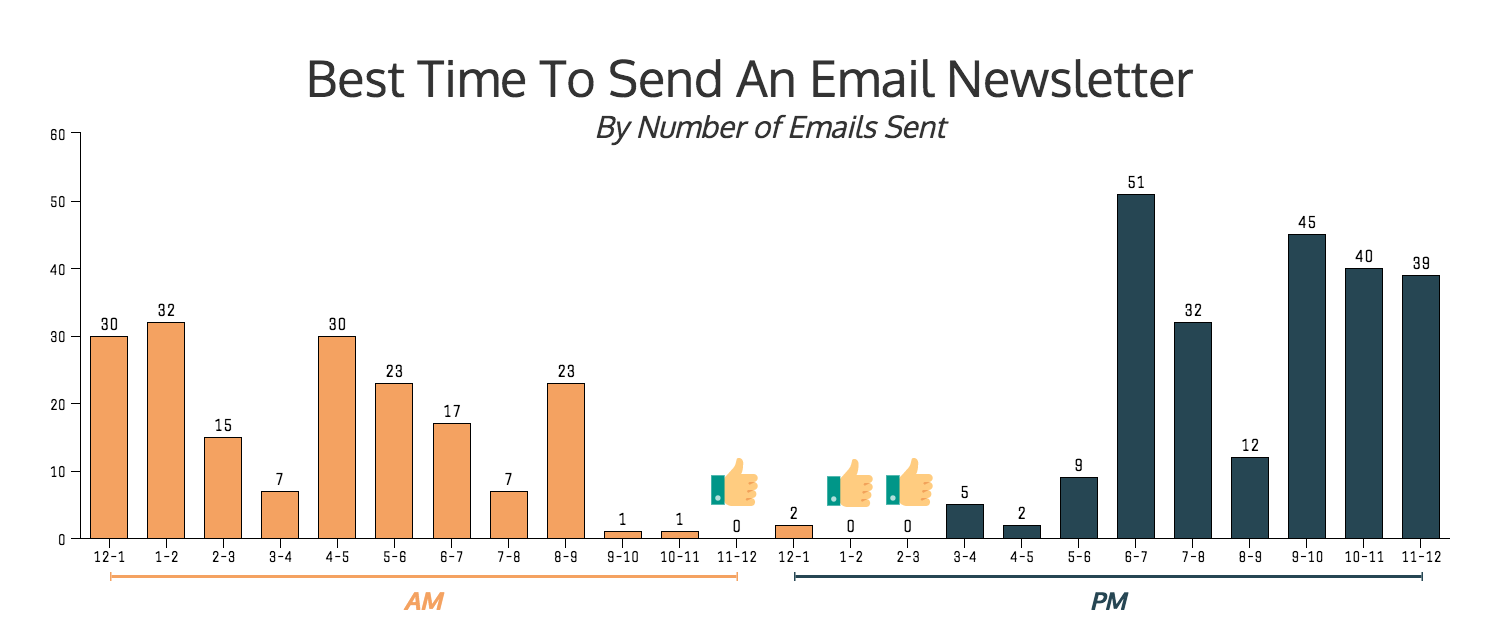
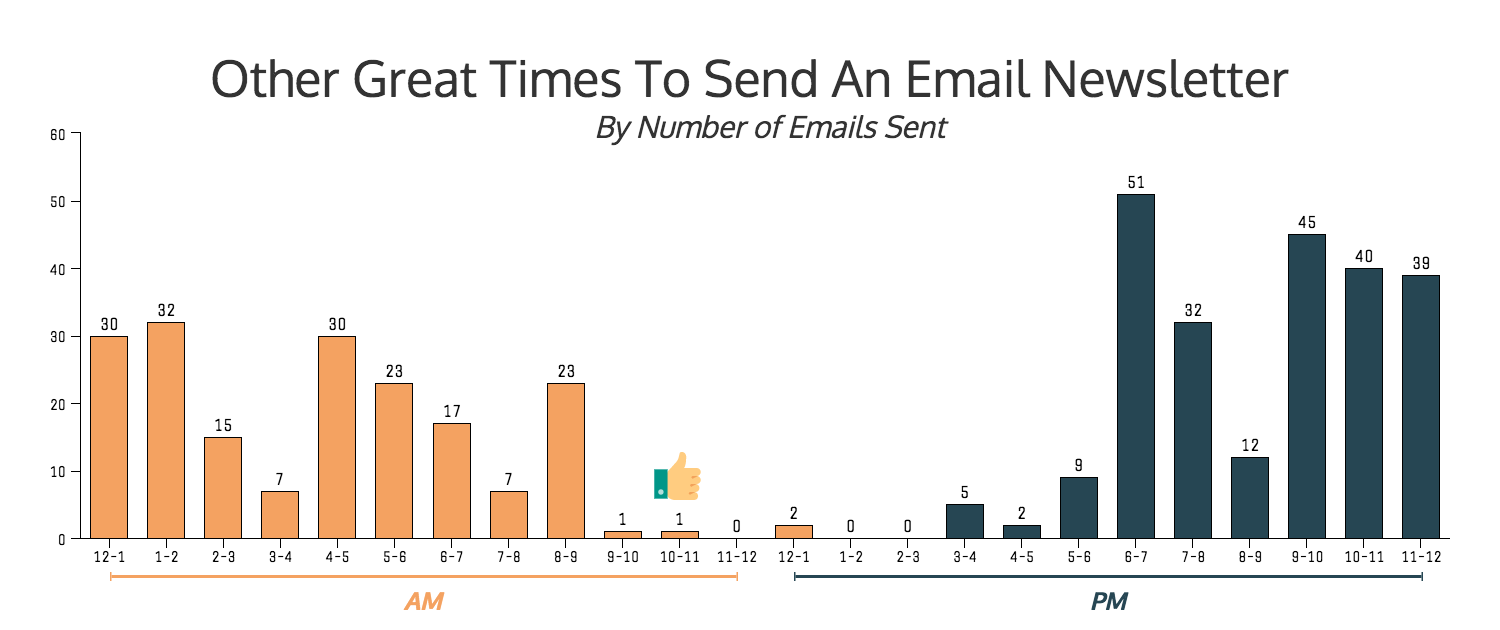
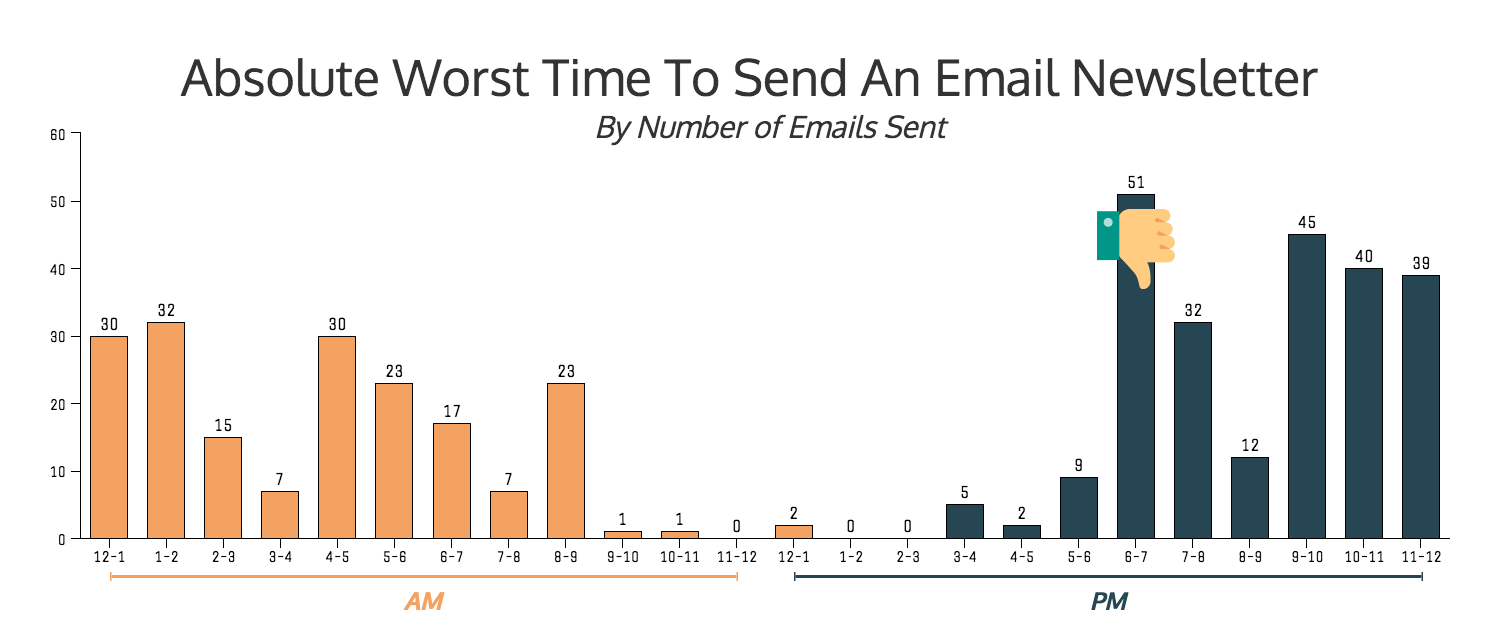
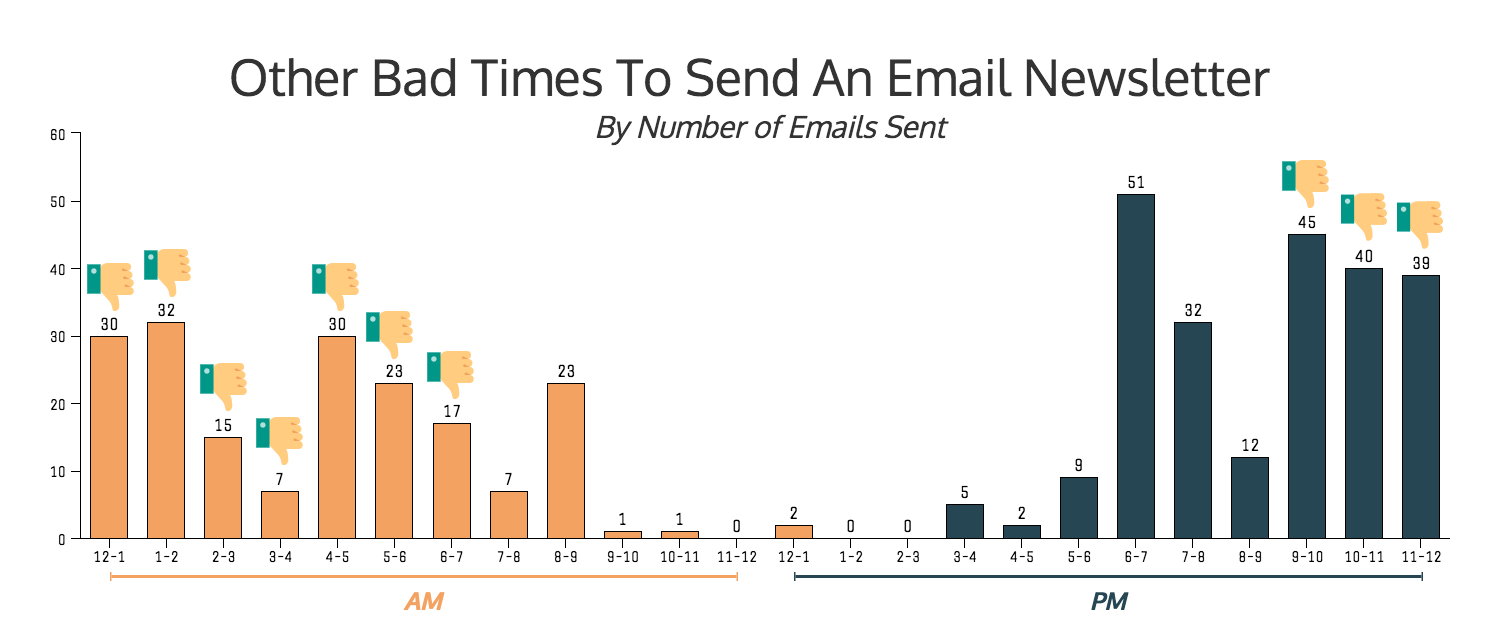
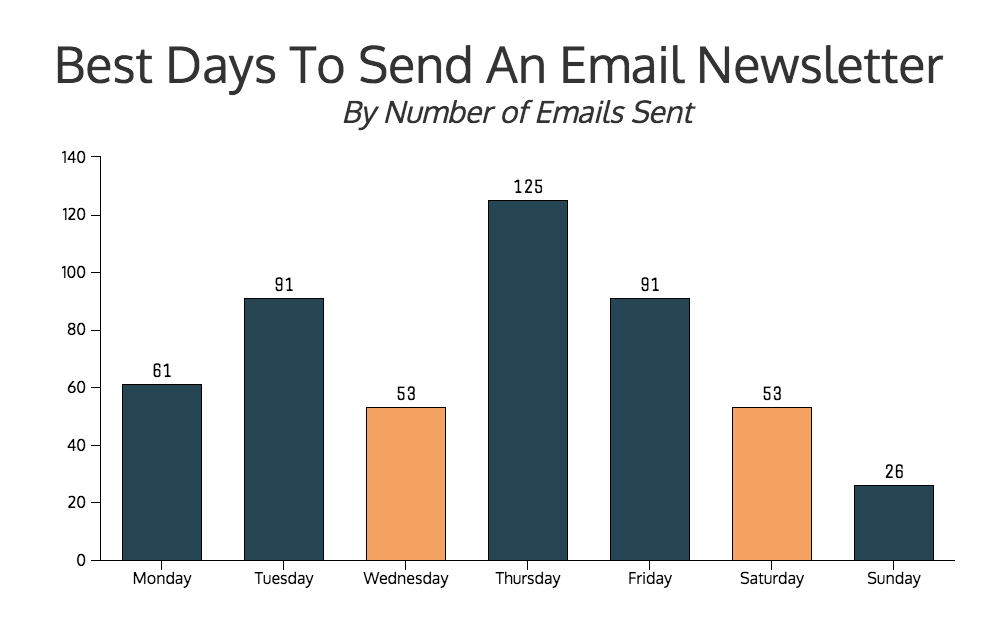
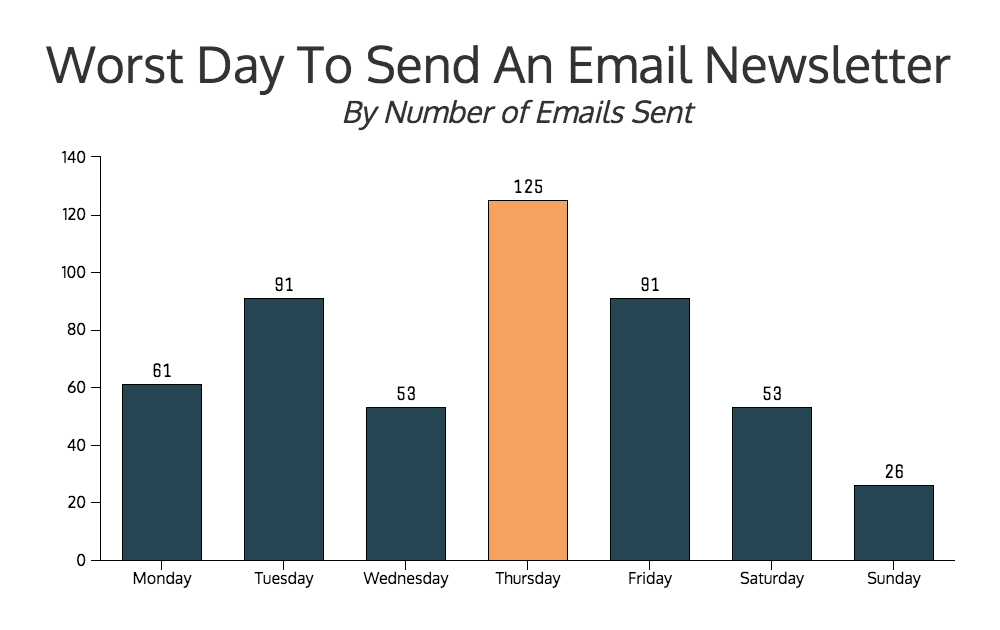
No comments:
Post a Comment